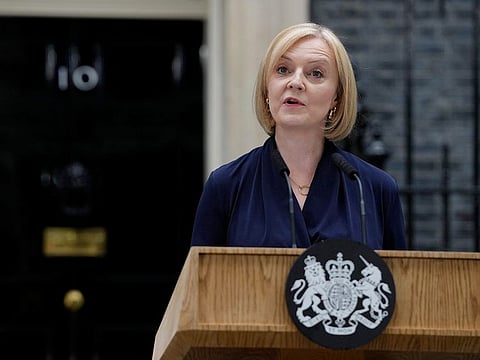Britain’s economic future looks bleak under Truss
All of this drama is playing out at a time when the very future of the UK is in peril

Since Jeremy Hunt became the man in charge — not just of the UK’s finances but seemingly the government too, Liz Truss appears to be without power.
To listen to Truss painfully try and explain her actions away to the BBC in an interview on Monday night, was simply that: Painful. I would have rather listened to fingernails screeching on a blackboard than hear Truss explain why she committed the greatest reversal in political — and economic — history since … well, ever. Maybe Napoleon beating a retreat from Moscow might compare in historical terms. In modern political terms, there has been nothing like it.
Right now, the UK government is in shambles.
It’s hard to forget that it was just three weeks ago that Truss and Kwasi Kwarteng outlined a budget that would freeze the energy prices for all British households for the next two years at the current levels.
They also promised to roll back a proposed increase in corporation taxes from 20 to 25 per cent, cut the basic rate of personal income tax from 20 pence to 19 pence, and abolish the top tax rate of 45 pence in the pound for those who earn over £150,000 annually.
The theory was that by cutting taxes, the move would instantly spur growth in the economy. The practice? Markets reacted negatively to the increased borrowing, interest rates shot up, and some 5 million British households face increased mortgage costs of at least £5,000 over the coming 12 months.
Now, Jeremy Hunt, brought in from the political wilderness to right the ship of state — heck, to try and salvage what little remains of Truss and her Cabinet’s credibility.
And Truss’ economic strategy has been shredded.
Hunt has scaled back those cuts, rolled back the energy price cap only until April, and gone further, saying that the government will have to cut back spending.
If Truss had an ounce of political astuteness, she would quit. If she had a scintilla of sense — fiscal or common — she would quit.
The Sun, the quintessential red top tabloid, has dubbed Truss the “ghost PM” across its front page. Editorially, it has always supported the Tories. Now, it’s calling for the party to consider installing Rishi Sunak or Ben Wallace as PM.
“The great office of the Prime Minister was yesterday reduced to an unedifying game of ghost-hunting,” it bellows.
“So what happens next? The thought of a broken PM having to appear at PMQs tomorrow is almost tragic. Yet allies insist she wants to fight on — and Tory MPs have no clear plan to replace her.
“What is not needed now is either an election, or another interminable leadership contest.
“If Truss cannot quickly sort herself out, the grown-ups need to get in a room with 1922 Committee chairman Graham Brady and agree a peaceful transition to a sensible figure like Rishi Sunak or Ben Wallace.”
The Daily Telegraph, a broadsheet that has long been a Conservative party voice and a title for whom Boris Johnson wrote weekly columns before entering 10 Downing Street, says that Truss’ “only hope of avoiding the ignominy of becoming the shortest-serving occupant of the post since George Canning in 1827 rests on whether Conservative MPs are willing to give her the breathing space to continue in No 10.”
They don’t seem to be
All of this economic and political drama is playing out at a time when the very future of the UK is in peril. In Northern Ireland, the nationalist Sinn Fein is in a majority, Welsh nationalists are giving support to Labour in government Wales, and the Scots are pushing for a second referendum on independence.
As Scotland’s First Minister Nicola Sturgeon points out to Scots with a logic that’s hard to defy right now: If you want this economic madness from London to stop, supporting independence is the only way that can happen.
Almost by coincidence, the Scottish Nationalist Party has set out its economic case for independence.
Eight years ago, the nationalists lost the referendum largely on their economic argument — the hearts said yes to going it alone, but the wallets and heads said no.
Now, the SNP says that it will have the pound as its currency initially, allowing it time to set up a central bank. But the Scots will set up their own currency, or will go with the euro.
High on the SNP agenda is rejoining the European Union, making right what it believes is the great wrong of Brexit. As part of its membership, the EU would likely require it adopt the common currency used now by 19 of the 27 members of the EU.
In Scotland, voters will want to know how secure their earnings, savings, loans and pensions will be with a new currency, and businesses will have a similar set of questions.
That’s if Scotland does indeed get its second referendum and wins a majority.
Right now, every Briton wants to know about the future of their savings and pensions. The Scottish question is pressing. The economic mess right now because of Truss is even more so.



